Justin Taylor's Blog, page 188
October 5, 2012
How Was Your Day, Kids?
“Fine.”
Sometimes I wonder if that’s the response that Adam got from Cain when he asked him throughout his life, “So how was your day, son?” I can almost see in my mind Abraham, at over 100 years old, walking into the tent, laying down his cane, and saying the same thing to Isaac, “So, my boy, my great hope, my promise from God… How was your day?”
“Fine.”
It’s the tried and true answer that kids give when they don’t really want to talk about how their day was; something to get their parents off their back so they can go back to the Wii, or the coloring, or the whatever. It’s also the answer that simultaneously infuriates and saddens moms and dads who want to have real interaction with their children that they haven’t seen sometimes for several hours.
I don’t like the answer. I’m not okay with the answer. There has to be more to it than that. In the answer, I feel the waning influence over my children; the reality that over time I will become less and less the main influence in their lives is acutely apparent. We’ve got to push passed the mere “fine” and into the details. But how do you do so with patience and love? Here are a couple of hints that seem to be effective (at least 10% of the time) with our kids who are now age 8, 5, and 2.
Read the whole thing, where he offers five suggestions: (1) Show respect; (2) Establish a regular time and place; (3) Get creative; (4) Be specific; (5) Have fun.
October 4, 2012
Recommended Biographies of Christian Women
Faith Cook is an author, biographer, and hymn writer. She grew up as a missionary child in war-torn China and has chronicled her story in an autobiography. Her biographical work has been on both men (from the well-known Fearless Pilgrim: The Life and Times of John Bunyan to the little-known William Grimshaw of Haworth) and women (like The Nine Day Queen of England: Lady Jane Grey, Selina: Countess of Huntingdon: Her Pivotal Role in the 18th Century Evangelical Awakening, and Anne Bradstreet: Pilgrim and Poet).
I recently corresponded with her to see if she could provide us with some recommendations of biographies about Christian women in church history. You can read her top five, with recommendations, below. After her list is a bonus list, courtesy of Michael Haykin, who sent along six recommendations, including two from Faith Cook.
(Men, these are for us, too! But it’s also not too early to think about some Christmas shopping here!)
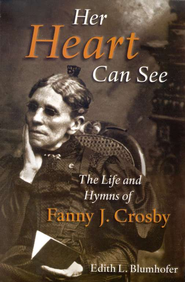 Edith L. Blumhofer, Her Heart can See: The Life and Hymns of Fanny J. Crosby (Eerdmans, 2005).
Edith L. Blumhofer, Her Heart can See: The Life and Hymns of Fanny J. Crosby (Eerdmans, 2005).
In Her Heart Can See Edith L Blumhofer, professor of history at Wheaton College, Illinois, has given us an authoritative and well-researched assessment of the life and hymns of Fanny J Crosby (1820-1915), sometimes known under her married name of Fanny van Alstyne. This remarkable little woman became blind soon after birth, but despite her handicap is described in the Guinness Book of World Records as history’s most prolific hymn-writer. She dictated more than 9,000 hymns and religious verse between the years 1864 and her death in 1915, often under different pseudonyms. Her hymns included well-loved classics as “Blessed Assurance,” “Jesus Is Mine,” “To God Be the Glory,” “Great Things He Hath Done,” “Teach Me Thy Way, O Lord,” and lesser-known hymns such as “Safe in the Arms of Jesus” and “Some Day the Silver Cord Will Break.”
In this fascinating biography Blumhofer blends the life of the blind poet with a remarkable and comprehensive study of the development of nineteenth-century religious life in New York.
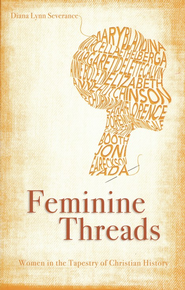 Diana L. Severance, Feminine Threads: Women in the Tapestry of Christian History (Christian Focus, 2011).
Diana L. Severance, Feminine Threads: Women in the Tapestry of Christian History (Christian Focus, 2011).
Here is a unique book packed with accounts of women throughout the long history of the Christian church. Dr Diana Severance starts with 1st century women such as Mary, mother of Jesus, followed by the early martyrs, Blandina and Perpetua, and takes us through the centuries until she reaches such familiar names as Corrie ten Boon, Elisabeth Elliot, Ruth Graham, and Joni Eareckson Tada.
Diana Severance, of Rice University, Texas, divides her material into twelve historical chunks, placing her characters against their own times and social backgrounds. Throughout this volume we are introduced to extracts from the writings of many of the characters described. Dr Severance is not afraid to include some surprising heroines of the faith, forcing us to reconsider our previous conclusions.
Of necessity, no more than a few pages can be devoted to each character, but this book serves as an excellent introduction to many of history’s half-forgotten Christian women.
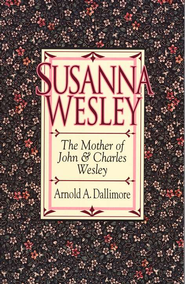 Arnold A. Dallimore, Susanna: The Mother of John and Charles Wesley (Evangelical Press, 1992).
Arnold A. Dallimore, Susanna: The Mother of John and Charles Wesley (Evangelical Press, 1992).
When Dr Samuel Annesley’s twenty-fifth child was born, the event may have raised a few eyebrows, but none could have suspected that this child would still be the subject of interest and biography more than 300 years later. The primary reason for this springs from her outstanding two sons, John and Charles Wesley, whose impact on the spiritual life not only of Britain, but on the church worldwide, has been immense.
But Susanna, exceptionally beautiful and married to Samuel Wesley at the age of eighteen, was a remarkable woman in her own right. With rare intelligence and strength of character she nurtured, trained, and influenced her sons in such a way that a study of her life throws a revealing light on the characters, contribution, and conflicts of both John and Charles Wesley.
In 168 highly readable pages Arnold Dallimore presents fascinating details of the Wesley family life, and yet leaves us with enough unanswered questions to prompt us to explore further. When was Susanna converted? John and Charles certainly considered it was in the last two years of her life. Certainly her reliance to some extent on ‘good works’ was a major hindrance. Did the same doctrinal error affect John Wesley at times? Did her stormy marriage to Samuel Wesley influence the saga of the unhappy marriages of most of her children? These and other questions are evoked by these pages, written by this gifted historian.
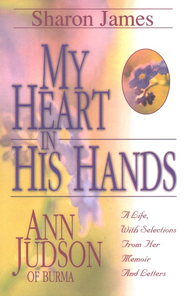 Sharon James, My Heart in His Hands: Ann Judson of Burma (Evangelical Press, 1998).
Sharon James, My Heart in His Hands: Ann Judson of Burma (Evangelical Press, 1998).
The first American woman missionary to venture to a little-known distant land, Ann Judson sailed to Burma with her husband Adoniram in 1812. With Burma (also known as Mayanmar) now increasingly open to a relaxation of its hard-line, secretive government, this account of Ann Judson’s short heroic life, recounted by Dr Sharon James, gives us a vivid picture of old Burma. Drawing freely on Ann’s memoirs and letters, Dr Sharon James brings her endurance, faith, and sufferings vividly before our eyes. With its skilful blend of narrative and evocative quotes, this is part biography and part autobiography. In days when the willingness to sacrifice for the gospel’s sake is far less common than once it was, this book is a stark reminder of the Saviour’s challenge to his followers to deny themselves, take up their cross, and follow him. Ann Judson’s tireless support, a support which eventually cost her health, and led to her early death at the age of thirty-seven, enabled her husband to set up the first Christian church in Burma.
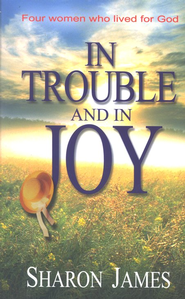 Sharon James, In Trouble and in Joy: Four Women Who Lived for God (Evangelical Press, 2003).
Sharon James, In Trouble and in Joy: Four Women Who Lived for God (Evangelical Press, 2003).
In days of economic recession we are always delighted to discover a bargain, and this publication is a bargain indeed—in fact four for the price of one! In an attractive hardback and well-illustrated publication, Dr Sharon James presents the lives of four Christian women who lived during the seventeenth to nineteenth centuries. After a short biographical chapter, we are treated to selections from the writings of each woman.
Margaret Baxter, wife of Puritan Richard Baxter abd whose romance with the austere preacher is one of the most charming and tenderest in the Puritan era, is Sharon James’s first choice. This is followed by a moving account of Sarah Edwards, wife of Jonathan Edwards, a woman whose deep spiritual experiences challenge and rebuke us still.
Two single women follow: Anne Steele and Frances Ridley Havergal. In both cases, these two have enriched the Christian church by their hymns, many of them still loved and sung today in spite of the explosion of modern hymns and songs. Sharon James’s own research has exposed some of the myths that have clung around Anne Steele, and reveal a modest woman of fragile health who devoted time and talents to God in a unique way. Likewise Frances Havergal used her extraordinary talents to write volumes of Christian verse and devotional literature. From a typical Victorian but privileged background, Havergal maintained a wide range of correspondence and it was she who coined the phrase “Her Heart Can See,” in a poem dedicated to Fanny Crosby.
The lives of these four godly women serve as a beacon for our own day, guiding us through the confusion and pitfalls of our own generation.
Professor Haykin offered the following recommendations of classic and contemporary biographies:
Gregory of Nyssa, The Life of Saint Macrina. An excellent patristic biography by a devoted brother (not without two or three theological problems).
Faith Cook, The Nine Day Queen of England: Lady Jane Grey. A remarkable woman.
Esther Edwards Burr, The Journal of Esther Edwards Burr. Not a biography per se, but records her life in the first person–the daughter of famous Jonathan Edwards and the mother of the future vice president Aaron Burr Jr.
Richard Baxter, Life of Margaret Charlton. This is the story of his wife’s life, a tremendous read.
Faith Cook, Selina: Countess of Huntingdon: Her Pivotal Role in the 18th Century Evangelical Awakening.
Priscilla Wong, Anne Steele and Her Spiritual Vision.
Dual Citizens: Getting Oriented during Election Season
 This election season is a good time to remember that the Christian life is a paradox.
This election season is a good time to remember that the Christian life is a paradox.
Take, for example, the question of where our citizenship resides.
The apostle Paul once warned that “no soldier gets entangled in civilian pursuits” (2 Tim. 2:4), and he insisted that “our citizenship is in heaven” (Phil. 3:20). This sounds like a single citizenship with only a heavenly zip code.
However, the same apostle Paul also declared that he was “a citizen of no obscure city” (that is, Tarsus) and avoided torture by appealing to his Roman citizenship, which gave him certain rights and prevented certain actions from the Roman authorities (Acts 21:39; 22:25-29). Paul knew that his fundamental identity was “hidden with God in Christ” and that he was to set his mind on “things that are above, not on things that are on earth” (Col. 3:1-3), but he also knew that he had earthly obligations and rights and that they were not insignificant.
Or, we can ask: Which city should we care about?
“Here we have no lasting city” (Heb. 13:14). Like Abraham, we look “forward to the city that has foundations, whose designer and builder is God” (Heb. 11:10).
And yet, as “sojourners and exiles (1 Pet. 2:11) we are commanded to “seek the welfare of the city . . . and pray to the LORD on its behalf” (Jer. 29:7).
And so the paradox goes.
We are not to be of the world—but we are sent into it (John 17:15-16; cf. 1 Cor. 5:9-10).
We must always be on guard to be transformed by the word—instead of conformed to the world (Rom. 12:2).
We are to keep ourselves “unstained from the world” (James 1:27)—and yet we must taste and shine like “salt and light” (Matt. 5:13-16) to a dark and rotting culture around us (cf. Phil. 2:15).
It is true that “this world is not our home,” but it’s not true that “I’m just passing through” like a leisurely amusement park ride.
We are dual citizens, responsible and active members of both God’s spiritual kingdom and earthly kingdom. And if we seek to love the Lord our God with all our heart, soul, and strength—and to love our neighbor as ourselves—then we should care to some degree about politics and elections and the role of government in our land.
Caring Too Much
Yes, some of us can care too much.
The political junkies among us follow every field poll and breaking-news alert and instant-debate analysis and breathless report on the latest pseudo-scandal, always craving our latest fix.
We find ourselves tempted to believe the worst about the candidates we disdain and to look the other way when our preferred candidate stretches the truth.
When our candidate loses the debate, we’re not just disappointed but depressed. And when our candidate wins, we feel unusually elated and expressive.
There’s a reason that 1 John ends rather abruptly: “Little children, keep yourselves from idols.” We all are tempted to idolatry and we all need to be warned against it. “Some trust in chariots and some in horses [and some in political candidates], but we trust in the name of the LORD our God” (Ps. 20:7).
Caring Too Little
And yet others of us care too little about politics.
Some argue that we should be invested in evangelism or preaching or social justice instead of politics. But most of us can care about both. Let me offer two reasons why we, as Bible-believing, gospel-centered evangelicals, should care about politics at varying levels and degrees.
First, we care about politics because we care about God’s glory and God’s good gift.
Everything is designed to be from God and through God and to God (Rom. 11:36)—including our government. Everything we do—from drinking our coffee in the morning to having a sandwich for lunch to voting at the booth to serving as an elected official—is to be done for the glory of God (1 Cor. 10:31). There is an objective and a subjective dimension to God’s reception of glory. As C. S. Lewis once said:
You will certainly carry out God’s purpose, however you act, but it makes a difference to you whether you serve like Judas or like John.
Why not serve and vote and work to move things in a more God-glorifying direction?
It is easy to despair about our government, especially in a time when the protection of life and the pursuit of liberty are being undermined. And it’s not wrong to feel frustration, especially when it is not going according to it’s God-given design. But we must never forget the goodness of God in instituting this system in our fallen world. God has appointed our rulers (Rom. 13:1-2) for our good (Rom. 13:4), and we are to respect and honor them (Rom. 13:7). (Before you object, don’t forget what the rulers were like when this was written!)
Government is a gift from God, designed to promote and protect good while serving as a deterrent to that which is bad (Rom. 13:2-4). One of the reasons we are to pray for our rules is so that government will function in such a way that we have the sort of conditions that allow us to live godly lives (1 Tim. 2:2).
Second, we care about politics because we care the good of our neighbors and the good of our country.
If you have to choose between evangelism and politics, choose evangelism. Saving an eternal soul is more important than fixing a temporal need. But most of the time, we don’t have to choose. And just because something is not ultimate does not means it is unimportant. Martin Luther King Jr., speaking from personal, painful experience, put it well:
While it may be true that morality cannot be legislated, behavior can be regulated.
It may be true that the law cannot change the heart but it can restrain the heartless.
It may be true that the law cannot make a man love me but it can keep him from lynching me and I think that is pretty important, also.
There are more important things in life than politics. It’s easy to become an idolatry. But it’s also easy to be too apathetic. As the Lord leads, let us commit to letting our politics be shaped by the gospel and informed by the word of God as we prayerfully work to become informed and to fulfill our roles, seeking the good of the city even as we wait for the city to come.
October 3, 2012
Moving toward Need and Practicing Hospitality
An inspiring and encouraging profile of Brian Dye, founder of the Legacy Conference, who ministers in the West Garfield Park neighborhood of Chicago :
Why I Don’t Believe in the Universal Fatherhood of God
Charles Spurgeon:
“Believe the doctrine of the Fatherhood of God to His people. Abhor the doctrine of the universal Fatherhood of God, for it is a lie and a deep deception.
It stabs at the heart, first, of the doctrine of adoption, which is taught in Scripture, for how can God adopt men if they are all His children already?
In the second place, it stabs at the heart of the doctrine of regeneration, which is certainly taught in the Word of God. Now it is by regeneration and faith that we become the children of God, but how can that be if we are the children of God already? ‘But as many as received him, to them gave he power to become the sons of God, even to them that believe on his name: Which were born, not of blood, nor of the will of the flesh, nor of the will of man, but of God’ (John 1:12-13). How can God give to men the power to become His sons if they have it already?
Believe not that lie of the devil, but believe this truth of God, that Christ and all who are by living faith in Christ may rejoice in the Fatherhood of God.
Charles Spurgeon, “Our Lord’s Last Cry from the Cross.”
HT: Radical Blog
October 2, 2012
Dangerous Calling
Paul Tripp on his new book, Dangerous Calling: Confronting the Unique Challenges of Pastoral Ministry:
You can read the introduction and first chapter here.
“This book is ‘good’ in the same way that heart surgery is good. It’s painful and scary and as you read it you’ll be tempted to run away from the truth it contains. But it just might save your life. Pastors need this book. I know I really needed it. It challenged me and rebuked me even as it gave me hope and fresh faith in God for pastoral ministry.”
—Joshua Harris, Senior Pastor, Covenant Life Church, Gaithersburg, Maryland; author, Dug Down Deep
“My friend Paul Tripp has done it again. With probing insight and robust realism, he takes an honest look into the challenges that are unique to, or intensified by, pastoral ministry. Gospel-centered and grace saturated to the core, Dangerous Calling is a must read for any pastor or pastor in training who needs to be encouraged by the reminder that Jesus came to do for us what we could never do for ourselves or others.”
—Tullian Tchividjian, Pastor, Coral Ridge Presbyterian Church; author, Jesus + Nothing = Everything
“Dangerous Calling is a dangerous book to read. It is also a book every person in ministry should read. It will cut you to the heart and bring massive conviction if you read it with a humility and ask God to expose sins deeply hidden in your soul. It cuts, but it also provides biblical remedies for healing. I would love to put this book in the hand of every seminarian who walks on my campus.”
—Daniel L. Akin, President, Southeastern Baptist Theological Seminary
“My friend Paul Tripp shines the spotlight of God’s Word into the heart of every pastor in this book, Dangerous Calling. If you have been in ministry for 20 minutes or 20 years, I commend it to you. Approach it prayerfully, passionately, and be prepared for the change God will make in your heart, life, and ministry.”
—James MacDonald, Senior Pastor, Harvest Bible Chapel; author, Vertical Church
“Pastoral ministry is a dangerous calling, and this is a dangerous book. It will not leave you unchanged. Pastors need pastors, and by God’s grace, every page of this book will minister to your heart, your marriage, your family, and the people you serve—in ways you never thought you needed it. This book digs down into the inner recesses of our hearts to reveal our greatest idols and point to our greatest needs. It will make you joyfully uncomfortable and, by God’s grace, will bring you to your knees in tears of thankfulness only to help lift your weary head to fix your renewed gaze on Christ. This book is like a mirror that redirects our hearts’ reflection from ourselves to Christ. If this book were a sermon, it would be the most weighty and refreshing sermon you’ve ever needed to hear. My sincere hope is that this book would be translated into multiple languages, become required reading in seminaries, and be ¬distributed to Christians everywhere who know they’re called to serve God and others with the gifts the Holy Spirit has equipped them.”
—Burk Parsons, Associate Pastor, Saint Andrew’s Chapel, Sanford, Florida; editor, Tabletalk magazine
“Our wives, children, and the members we serve will have a new husband, father, and pastor by Friday if we follow Tripp’s example and give a humble and honest reading of this book—one with our inner Pharisee and scribe turned off. We will see the need to save our selves from a very dark and destructive force working against pastors: undiagnosed pastoral self-righteousness. With much wisdom and conviction, Tripp’s Dangerous Calling preaches the gospel of grace to the men who are preaching the gospel Sunday after Sunday to everyone but themselves.”
—Eric C. Redmond, Executive Pastoral Assistant and Bible Professor in Residence, New Canaan Baptist Church; Council Member, The Gospel Coalition
“Few would regard a pastor’s role as a dangerous calling, but few people are as qualified and insightful as Paul Tripp to penetrate the snares and potential pitfalls associated with pastoral ministry. Fewer still would prescribe such gospel based and local church rooted remedies. This excellent volume should be read, re-read & applied.”
—Terry Virgo, founder, Newfrontiers
What Do I Owe to the Person Who Differs from Me?
 In a classic article that all of us should consider reading (or re-reading) at one point or another, the late theologian Roger Nicole looks at several principles for relating to those with whom we differ. He argues that there are three major questions we must ask, and we must ask them in precisely the following order:
In a classic article that all of us should consider reading (or re-reading) at one point or another, the late theologian Roger Nicole looks at several principles for relating to those with whom we differ. He argues that there are three major questions we must ask, and we must ask them in precisely the following order:
What do I owe the person who differs from me?
What can I learn from the person who differs from me?
How can I cope with the person who differs from me?
I encourage you to read the whole article. I’ll excerpt here portions of his answer to just the first question. Although he doesn’t cite Romans 13:8, his answer is essentially an elaboration and application of it: “Owe no one anything, except to love each other, for the one who loves another has fulfilled the law.”
He first established that we really do have obligations to people who differ from us.
This does not involve agreeing with them. We have an obligation to the truth, and that has priority over agreement with any particular person. If someone is not in the truth, we have no right to agree. We have no right even to minimize the importance of the difference. Consequently, we owe them neither consent nor indifference. But what we owe that person who differs from us, whoever that may be, is what we owe every human being–we owe them love. And we owe it to them to deal with them as we ourselves would like to be dealt with or treated. (Matthew 7:12)
Dr. Nicole then looks at two ways in particular that we want to be treated.
First, we want people to know what we are saying or meaning. If we are going to voice differences, therefore, we have an obligation to make a serious effort to understand the person with whom we differ. That person may have published books or articles. Then we should be acquainted with those writings. It is not appropriate for us to voice sharp differences if we have neglected to read what is available. The person with whom we differ should have evidence that we have read carefully what has been written and that we have attempted to understand its meaning. In the case of an oral exchange where we don’t have any written words, we owe the person who differs from us the courtesy to listen carefully to what he or she says. Rather than preparing to pounce on that person the moment he or she stops talking, we should concentrate on apprehending precisely what his or her position is. . . .
Even that is not enough, however. Beyond what a person says or writes, we must attempt to understand what a person means. Now it is true that there are what are called “Freudian slips.” That is, there are people who do not express themselves exactly in the way it should be done and in the process somehow they give an insight into a tendency that is in them all along and which leads them to express themselves in an infelicitous but revealing manner. So it is appropriate, I suppose, to note this as a personal footnote, so to speak, in order possibly to make use of it at some time in the discussion. But if somebody fails to express himself or herself accurately, there is no great point in pressing the very language that is used. We ought to try to understand what is the meaning that this language is intended to convey. In some cases, we may provide an opportunity for an opponent to speak more accurately.
He then gives this illustration, which has stuck with me since I first read this article several years ago:
I have experienced this in my own home. I have noticed that my wife sometimes says things like, “You never empty the wastebasket.” Now as a matter of fact, on January 12, 1994, I did empty the wastebasket. Therefore, the word never is inappropriate! This tends to weaken the force of my wife’s reproach. Well, I’ve learned that I don’t get anywhere by pressing this point. This kind of response does not provide dividends of joy and peace in my home. I’ve learned, therefore, to interpret that when my wife says “never” she often means “rarely” or “not as often as should be.” When she says “always,” she means “frequently” or “more often than should be.”
Instead of quibbling as to the words never and always, I would do well to pay attention to what she finds objectionable. And indeed, I should be emptying the wastebasket. Feminist or not feminist, a husband and father should empty the wastebasket; and therefore, if I fail to do this, even only once, there is a good reason to complain. Nothing is gained by quibbling about how often this happens. I ought to recognize this and be more diligent with it rather than to quote the dictionary.
He also applies this to our theological discussions:
Similarly, in dealing with those who differ, we ought not to split hairs about language just in order to pounce on our opponent because he or she has not used accurate wording. It is more effective to seek to apprehend what is meant and then to relate ourselves to the person’s meaning. If we don’t do that, of course, there is no encounter because this person speaks at one level and we are taking the language at another level. The two do not meet and the result is bound to be frustrating. If we really want to meet, we might as well try to figure out the meaning rather than to quibble on wording.
He goes on to the second way in which we want others to treat us (and therefore owe to others to do the same):
Moreover, I would suggest that we owe to people who differ from us to seek to understand their aims. What is it that they are looking for? What is it that makes them tick? What is it that they are recoiling against? What are the experiences, perhaps tragic experiences, that have steeled them into a particular stance? What are the things that they fear and the things that they yearn for? Is there not something that I fear as well or yearn for in the same way? Is there not a possibility here to find a point of contact at the very start rather than to move on with an entirely defensive or hostile mood? . . .
In summary, I would say we owe it to our opponents to deal with them in such a way that they may sense that we have a real interest in them as persons, that we are not simply trying to win an argument or show how smart we are, but that we are deeply interested in them–and are eager to learn from them as well as to help them.
He then closes this section with a practical suggestion:
One method that I have found helpful in making sure that I have dealt fairly with a position that I could not espouse was to assume that a person endorsing that view was present in my audience (or was reading what I had written). Then my aim is to represent the view faithfully and fully without mingling the criticism with factual statements. In fact, I try to represent them so faithfully and fully that an adherent to that position might comment, “This man certainly does understand our view!” It would be a special boon if one could say, “I never heard it stated better!” Thus I have earned the right to criticize. But before I proceed to do this, it is only proper that I should have demonstrated that I have a correct understanding of the position I desire to contest.
You can (and probably should!) read the whole thing here.
Set Priorities and Let Others Do the Same
 A good reminder from Kevin DeYoung:
A good reminder from Kevin DeYoung:
To conquer busyness we need not only to set priorities, but to respect that others must set them too. This means understanding when people say no. It sometimes means not asking in the first place.
Obviously, we shouldn’t say no to everything. We should be inconvenienced at times. It’s not always wrong to press someone for a favorable response. But simply remembering that most everyone else feels as busy as you do could do a lot to help everyone’s feeling of busyness. Don’t always expect the lunch request to work or that you’ll get a reply to the “what-do-you-think?” email. Don’t be offended if your inquiry doesn’t go to the top of the pile. We all have priorities, and unless you’re God, none of us deserve to be the priority for everyone else all the time.
You can read the whole thing here.
The Global Study Bible
Francis Chan explains the need and the vision of getting the new Global Study Bible into the hands of Christian leaders and believers around the world:
You can learn more at globalstudybible.org.
October 1, 2012
Ethnicity and the Mission of God
Thabiti Anyabwile, speaking at the 2012 Truth and Life Conference at the Master’s College, sharing from his background as a victim of racism—and his development into a racist. He makes his argument that many of us make unbiblical assumptions in defining who we are.
Justin Taylor's Blog
- Justin Taylor's profile
- 44 followers





